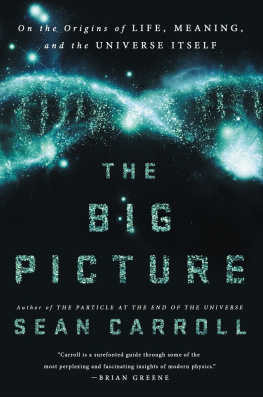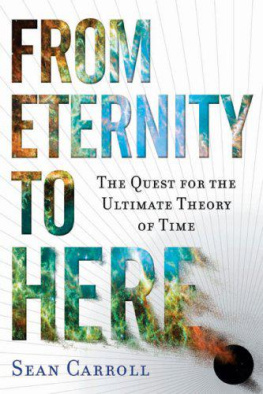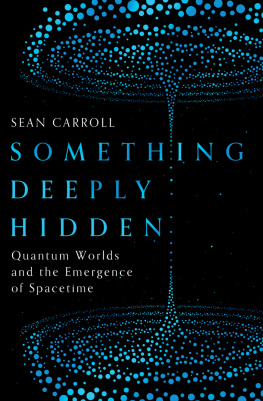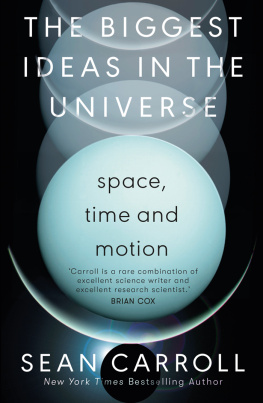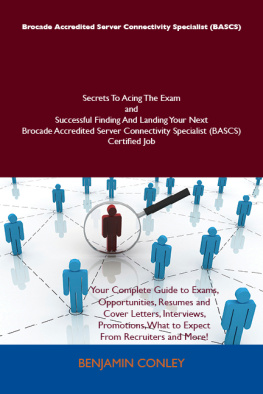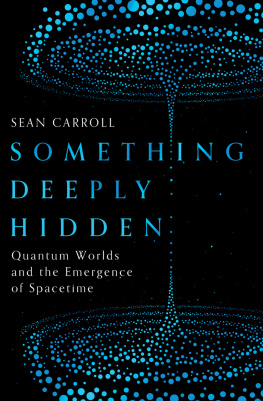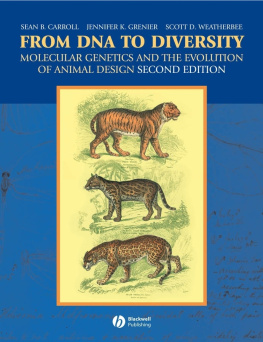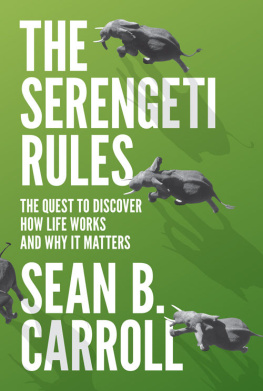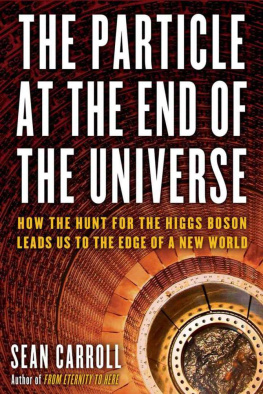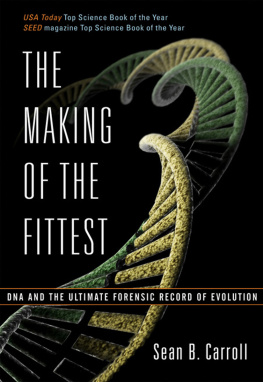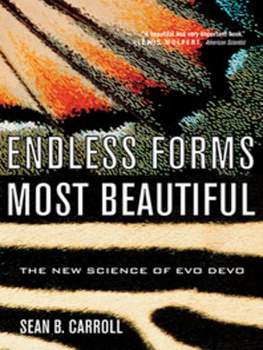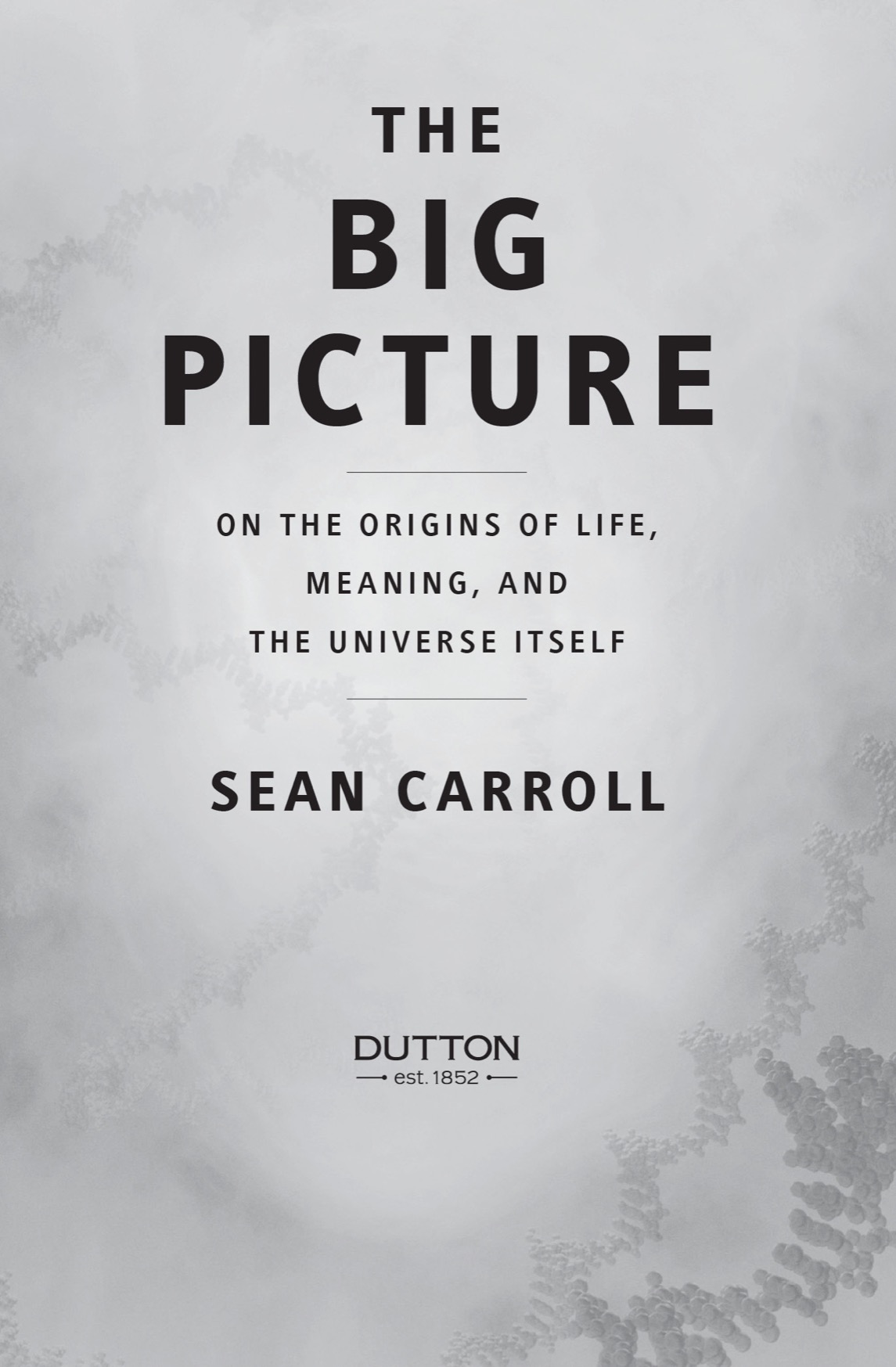ALSO BY SEAN CARROLL
From Eternity to Here: The Quest for the Ultimate Theory of Time
The Particle at the End of the Universe: How the Hunt for the Higgs Boson Leads Us to the Edge of a New World

An imprint of Penguin Random House LLC
375 Hudson Street
New York, New York 10014

Copyright 2016 by Sean Carroll
Penguin supports copyright. Copyright fuels creativity, encourages diverse voices, promotes free speech, and creates a vibrant culture. Thank you for buying an authorized edition of this book and for complying with copyright laws by not reproducing, scanning, or distributing any part of it in any form without permission. You are supporting writers and allowing Penguin to continue to publish books for every reader.
DUTTONEST. 1852 (Stylized) and DUTTON are registered trademarks of Penguin Random House LLC.
All photographs courtesy of the author unless otherwise noted.
Photograph on title and part title pages Chad Baker/Photodisc/Getty Images
LIBRARY OF CONGRESS CATALOGING-I N-PUBLICATION DATA
Names: Carroll, Sean M., 1966 author.
Title: The big picture : on the origins of life, meaning, and the universe itself / Sean Carroll.
Description: New York, New York : Dutton est. 1852, an imprint of Penguin Random House LLC, [2016] | Includes bibliographical references and index.
Identifiers: LCCN 2015050590| ISBN 9780525954828 (hc) | ISBN 0525954821 (hc) | ISBN 9780698409767 (eBook) | ISBN 0698409760 (eBook)
Subjects: LCSH: LifeOrigin. | Meaning (Philosophy) | Cosmology. | Naturalism. | Discoveries in science. | EvolutionPhilosophy. | Physical laws.
Classification: LCC QH325 .C36 2016 | DDC 577dc23
LC record available at http://lccn.loc.gov/2015050590
While the author has made every effort to provide accurate telephone numbers, Internet addresses, and other contact information at the time of publication, neither the publisher nor the author assumes any responsibility for errors or for changes that occur after publication. Further, the publisher does not have any control over and does not assume any responsibility for author or third-party websites or their content.
Version_1
To my teachers:
Mrs. Eberhardt, Edwin Kelly, Edward Guinan, Jack Doody, Colleen Sheehan, Peter Knapp, George Field, Sidney Coleman, Nick Warner, Eddie Farhi, Alan Guth, and so many others. Thank you for challenging me.
Contents
Prologue
O nly once in my life have I been truly close to dying.
My judgment was a bit off. It was dark, the traffic was heavy. An inattentive driver on the 405 freeway in Los Angeles veered in front of me to avoid an exit ramp, and I swerved to avoid him. The enormous eighteen-wheeler in the lane to my left wasnt as far back as I thought. The very last inch of my back bumper caught the very front corner of the trucks cab. That was enough. I lost all control of my car, which executed a slow and stately counterclockwise turn, ending with my drivers side flush into the front of the truck, still speeding down the freeway. It was slow and stately from my perspective, anyway. I felt as if I were trapped in amber, watching helplessly as my car moved of its own volition, until it nestled against the trucks grill, perpendicular to the direction of traffic, a blinding headlight shining in my face.
I was shaken but unhurt. The car was a bit rumpled, and needed some serious work in the body shop, but it was able to drive me home once all the police reports had been filled out. A few inches here, a change of speed there, a bit more panic on the part of the truck driverthings could have been different.
Many of us come close to dying, long before we do die. We confront the finitude of our lives.
In my professional capacity as a physicist I study the universe as a whole. Its a big universe. Fourteen billion years after the Big Bang, the region of space we can directly see is populated by a few hundred billion galaxies, averaging a hundred billion stars each. We human beings, by contrast, are quite tinya recent arrival on an insignificant planet orbiting a nondescript star. Whatever the outcome of my freeway misadventure had been, my lifetime would be measured in decades, not in billions of years.
A person is a diminutive, ephemeral thing, standing smaller in comparison with the universe than a single atom stands in comparison with the Earth. Can any one individual existence really matter?
In some sense it obviously can. I live a fortunate life, with family and friends who care about me, and who would be extremely upset were I to die. I myself would be quite unhappy if I somehow knew ahead of time that my life was going to end. But from the perspective of a vast, seemingly indifferent cosmos, does it really matter all that much?
I like to think that our lives do matter, even if the universe would trundle along without us. But we have to respect the question, and work hard to understand how our desire to matter fits in with the nature of reality at its deepest levels.
A friend of mine, a neuroscientist and biologist, can make individual cells young again. Scientists have developed techniques for taking stem cells in the adult human body, which have aged and taken on some more mature characteristics, and reverse-aging them until they are just like newborn stem cells.
There is a long road from cells to complete organisms. So I asked her, half-jokingly, whether we would someday be able to reverse-age human beings, and potentially keep them young forever.
You and I are going to die someday, she mused. But if either of us has grandchildren, I wouldnt be so sure.
Thats thinking like a biologist. As a physicist, I know it doesnt violate any laws of nature to imagine living beings lasting for millions or even billions of years, so I have no objection there. But eventually all of the stars will have exhausted their nuclear fuel, their cold remnants will fall into black holes, and those black holes will gradually evaporate into a thin gruel of elementary particles in a dark and empty universe. We wont really live forever, no matter how clever biologists get to be.
Everybody dies. Life is not a substance, like water or rock; its a process, like fire or a wave crashing on the shore. Its a process that begins, lasts for a while, and ultimately ends. Long or short, our moments are brief against the expanse of eternity.

We have two goals in front of us. One is to explain the story of our universe and why we think its true, the big picture as we currently understand it. Its a fantastic conception. We humans are blobs of organized mud, which through the impersonal workings of natures patterns have developed the capacity to contemplate and cherish and engage with the intimidating complexity of the world around us. To understand ourselves, we have to understand the stuff out of which we are made, which means we have to dig deeply into the realm of particles and forces and quantum phenomena, not to mention the spectacular variety of ways that those microscopic pieces can come together to form organized systems capable of feeling and thought.

